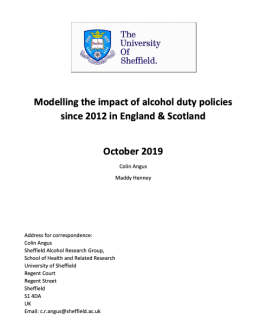Modelling the Impact of Alcohol Duty Policies Since 2012 in England & Scotland

In 2008 the UK introduced a ‘duty escalator’ which meant alcohol duties (government tax collected by HM Customs and Excise) would rise by 2% above inflation each year until 2012. However, since then the preceding governments have abolished the duty escalator and alcohol duties have been cut or frozen.
This report, commissioned by the Institute of Alcohol Studies and put together by the Sheffield Alcohol Research Group, investigates the consequence of changes in alcohol policy on alcohol consumption, health, crime and workplace outcomes.
The publication includes details of the methods used to examine alcohol policy and the results of the analysis carried out in England and Scotland.
- The investigators provide details on:
- Alcohol consumption
- Consumer spending on alcohol
- Alcohol-attributable deaths
- Alcohol-attributable hospital admissions
- Healthcare costs
- Criminal offences and associated costs
- Workplace absence and associated costs
- Impacts on health inequalities
Some of the key findings are that:
- Following the abolition of the alcohol duty escalator along with duty freezes and cuts, there has been an increase in alcohol consumption and related harms
- It is estimated that if the original plan put in place in 2012 was continued, it would have prevented 1,969 additional deaths in England and 254 in Scotland.
- Introducing the duty escalator once more in 2020 is estimated to lead to 4,710 fewer alcohol-attributable deaths in England and 420 fewer in Scotland
These striking results highlight the responsibility of the government to examine alcohol policy and consider reintroducing the alcohol duty escalator so that some of the severe damage can be prevented in the future.
